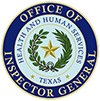OIG collaborates with other agencies to stop health care fraud
Throughout fiscal year 2021 (FY 21), the OIG collaborated with law enforcement agencies across Texas to arrest and successfully prosecute individuals who seek to defraud state health and human services.
In December, the owner of a Texas hospice company based in San Antonio was sentenced to 20 years in federal prison for his role in a $150 million health care scheme. Investigators said the defendants enrolled patients at group homes and nursing homes by falsely telling them they had less than six months to live and sending chaplains to lie to them and discuss last rites. However, the patients did not have terminal illnesses with the six-month prognosis that hospice care requires. This case was investigated by the Rio Grande Valley Health Care Fraud Task Force, which includes the OIG, the FBI and the Texas Attorney General Medicaid Fraud Control Unit.
In May, a Beaumont restaurant owner was sentenced to 27 years in prison for trafficking SNAP benefits. OIG investigators detected irregularities at a large discount retailer and launched an investigation. OIG investigators from across the state coordinated with multiple agencies to search the restaurant, arrested the restaurant owner, and obtained signed statements from several other offenders and witnesses. Sixty-two SNAP clients were charged and accused of selling their SNAP benefits to the restaurant owner. The restaurant owner used the benefits to make purchases for his restaurant at the large retailer.
The OIG was part of a multi-agency investigation that led to indictments against seven people in a $110 million compound drug operation. In June, a federal grand jury in McAllen returned a 15-count indictment. A compound pharmacy owner, three marketers, a referring physician and two clinic office staff were all taken into custody. The indictment alleges three of the accused served as marketers for the pharmacy and delivered several million dollars in kickbacks for referring prescriptions for high-reimbursing compound drugs to the pharmacy, including prescriptions that were not medically necessary or what the patients wanted. The OIG was part of the investigation that included inspectors general from the U.S. Postal Service, Department of Labor, Veterans Affairs, and U.S. Department of Health and Human Services, along with the FBI, Defense Criminal Investigative Service and the Texas Attorney General Medicaid Fraud Control Unit.
Read more about the OIG’s work in FY 21 in its latest Quarterly Report.

